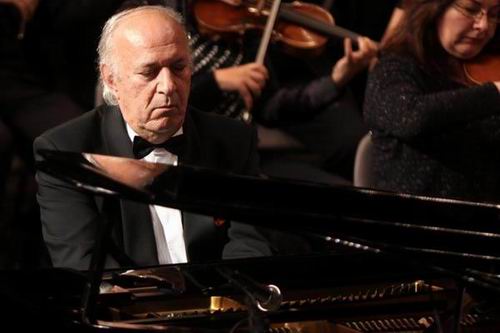He won’t thank anyone for reminding him, but when Omar Khairat first joined the Cairo Conservatoire to study piano in 1959, Dubai had just built its first international airport, serving the 90,000 people – in total – who lived in the UAE. A lot has changed since then – both for Khairat and Dubai. But as one of the Middle East’s most popular composers returns for his third performance tonight, they seem made for each other.
“You know, it’s a good place for me to play, as it’s often said my music crosses cultural boundaries and Dubai is certainly a melting pot of a place where that now happens,” says the 65-year-old. “The structure of my compositions is of my own making – a mixture between western, oriental, jazz and, of course, Arabic sounds. But I’ve come to think that’s how people listen to music, through the internet and iTunes. What is a great thrill is that they also like to hear it live.”
Tonight, Khairat will bring his 16-strong band to Emirates Golf Club to play a selection of favourites from across the decades. Although he began as a straight pianist, Khairat’s compositions for television (most notably The Bangles), and more than 50 films, won him awards and acclaim. And it all began in the early 1980s with The Night of Fatma’s Arrest (1984), one of the Egyptian director Henry Barakat’s last films.
“That was an important moment in my career,” admits Khairat. “But to be honest, it feels like I’ve had plenty of them, right back to being one of the first students in the Cairo Conservatoire, which was founded by my uncle Abu Bakr Khairat. When I look at it now, studying composing when I was growing up was important, but then so was getting involved with pop music and jazz and playing drums in Les Petits Chats.”
There weren’t too many Egyptian bands at that time but it was the 1960s and Khairat tapped into the boundless sense of possibility of the era: he didn’t actually know how to play the drums and never had a lesson.
“Les Petits Chats was fun and serious at the same time,” he recalls. “We used to do international pop songs and we did them with real love. It took me around five years to master the drums, actually, and I loved it because rhythm is very important to music. Knowing the drums helped me a lot later as a composer – and not just rhythmically. Being in a band where harmony and melody were key was a great influence.”
And from that moment forward, Khairat rarely concerned himself with one genre. He says the difference between a composition for film or television and a more academic piece for a symphony orchestra is only in the amount of exposure it might receive. “I guess the fact that you know a work will be played a lot does affect what you write,” he says. “And when you play it live, it’s great that people already know the tunes – and thank God they like them.”
In fact, Khairat still rearranges his well-known soundtracks when he plays them live, just because he worries that a score for a film might be a bit difficult to follow without the images. It all lends the impression of a musician still keen to please, still hopeful that his goal – “to marry eastern and western music” – can be achieved.
“It’s hard to say which piece is my favourite, but I know people like The Bangles very much,” he says. It’s a telling observation: The Bangles is certainly the recording where the western harmonies are most obvious within a sound that is still notably Arabic.
Khairat is one of those rare musicians to have a signature style without ever lapsing into repetition. So how does he describe it?
“Well, it’s important for the music to be emotional. Arabs are sentimental people. They like rhythms. After that, maybe, the tune, orchestration and harmony is different each time, but it comes from me and I think people notice that. Where I’ve lived is reflected in my music, and my country is where my passions come from.”
So, would Khairat, who is currently based in Cairo, ever compose something reflecting on the political situation in Egypt?
“Actually, I am preparing something along those lines with another artist, but it’s still early days,” he reveals.
“How do I feel about Egypt? I feel all right. The coming days will be much better. You know, it’s only six months since we had another revolution, we’ve now got two presidents in jail and house arrest. It’s amazing, really. But I feel that we have some more honesty now.”
Aside from the composition on Egypt, Khairat plans to continue his incredible output – working on more soundtracks in between his live commitments.
“I just love to play everything,” he says, laughing. “I have also written overtures, ballets, I have composed for big symphonic orchestras. In the end, it’s all music, but of course, you can’t do it all.”

